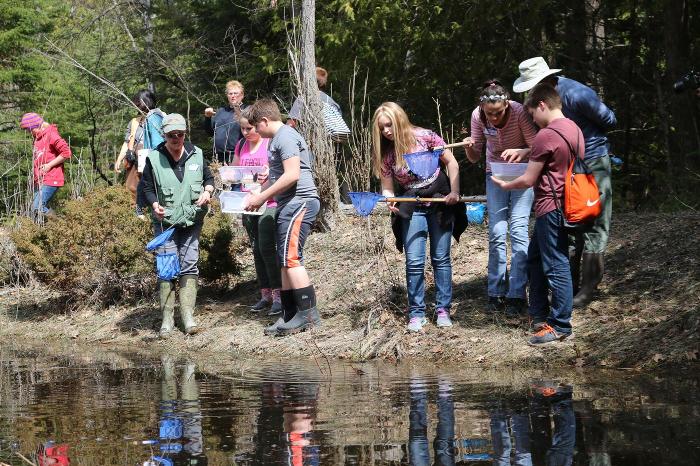
Students learning about vernal pools. Photo courtesy of Brandon Schroeder via Michigan Vernal Pools Partnership
Vernal pools are a critical part of Michigan’s natural ecosystem—but they’re not protected by state regulations. Here’s how Michiganders are helping.
Imagine you’re out hiking in the woods. It’s a fresh spring day—the air is still damp with the end of winter, and the ground’s a little soggy from recently melted snow. You pass a tree and see something—a small, shallow pool of water. You chalk it up to the snow melt and keep on your way.
What you’ve just passed is a vernal pool—one of Michigan’s rarest bodies of freshwater. And it’s absolutely critical to the future of our forests, lakes, and farmland.
On a recent Sunday afternoon in Okemos, dozens of nature lovers gathered at the Michigan Nature Association to join the Vernal Pool Patrol—a group of volunteers across the Mitten who act as citizen scientists, looking for vernal pools near them and collecting data to send to the Michigan Natural Features Inventory (MNFI). So far, community members and scientists have mapped around 900 vernal pools in Michigan. But there are still about 4,400 to go.
“Part of the reason we started the Vernal Pool Patrol is because we realized that there’s not much information out there about where these vernal pools are,” said Yu Man Lee, a herpetologist—someone who studies reptiles and amphibians—with the MNFI.
To be part of the Vernal Pool Patrol means you need to be something of a nature sleuth. “Vernal” means spring, and vernal pools are formed when the snow melts. By summer, they usually dry up. But when they’re here, they’re so important that they’ve been called the “coral reefs of Northeastern forests.”
“You can hear when you walk up to [a vernal pool] because it’s full of wood frogs,” said Abigail Pointer, the Michigan Nature Association’s vernal pools partnership coordinator.
The frogs are there because it’s a safe haven for them to rest, eat, and reproduce. Having a fishless habitat is important to the life cycle of many of Michigan’s creatures, like fairy shrimp, spotted salamanders, and in some areas, turtles.
“They’re a great place for animals to seek shelter and find food,” Pointer said.
In addition to being a breeding and feeding ground for animals and insects—including rare, threatened, and endangered species—vernal pools help reduce flooding and erosion by catching runoff and trapping water and sediments. By constantly filling up in the spring and drying up in the fall, these small bodies of water also help cycle nutrients throughout the ecosystem.
A problem vernal pools currently face is that they’re not well protected under Michigan’s wetland laws and regulations, which only apply to wetlands that are five acres or more in size.
“Because they’re so small, vernal pools don’t [usually] meet these criteria,” said Lee, the herpetologist.
That means construction, development, and the effects of local and global extreme weather can have serious impacts on vernal pools—and the ecosystems they’re part of.
How can Michiganders help?
Any Michigander can become a Vernal Pool Patroller, from any generation.
“We’ve done some work with educators and teachers in schools that are now participating in the program,” Lee said. “We work with students who are in middle school and high school and teach them the protocol necessary to collect accurate data. We’ve even had second graders out to explore a vernal pool with us.”
At the Okemos event, younger attendees gathered at tables to color black-and-white pictures of Michigan wildlife with crayons. Matching games interested elementary and middle school kids, testing their knowledge by identifying macroinvertebrates—animals or insects that don’t have a backbone, like crustaceans or worms—that can be found in ecosystems throughout Michigan forests. Handouts with pictures of invasive plant species were distributed by volunteers, while many older Michiganders took interest in the tri-fold, educational poster boards lining the welcoming halls.
“It’s cool that it seems like no matter the age, there seems to be this innate interest in science for folks,” Lee said. “In just a couple scoops with a net from the pools and stuff, you’re able to see species like fairy shrimp, which you never see anywhere.”
To find one near you, visit the Michigan Vernal Pools Database. To get involved in protecting vernal pools, the Michigan Vernal Pools Partnership has a helpful toolkit for advocates and nature lovers in communities. If you’re an educator, a parent, or a grandparent who wants to teach Michigan’s youngest generations about vernal pools, here’s a guide. And if you just want to see awesome photos of what volunteers have found in our state’s vernal pools, head to this photo gallery.
Support Our Cause
Thank you for taking the time to read our work. Before you go, we hope you'll consider supporting our values-driven journalism, which has always strived to make clear what's really at stake for Michiganders and our future.
Since day one, our goal here at The 'Gander has always been to empower people across the state with fact-based news and information. We believe that when people are armed with knowledge about what's happening in their local, state, and federal governments—including who is working on their behalf and who is actively trying to block efforts aimed at improving the daily lives of Michigan families—they will be inspired to become civically engaged.


About 72% of Michigan students considered not ‘college ready’
By Clara Lincolnhol, Capital News Service LANSING – Nearly three quarters of Michigan high school students are considered to be unprepared for...

Appeals court backs Michigan school in banning ‘Let’s Go Brandon’ shirts
SAND LAKE, Mich. (AP) — A federal appeals court on Tuesday ruled in favor of a Michigan school district in a dispute over free speech and "Let's Go...

Legislature passes $21.3B school aid budget, securing school meals and increased student funds
BY KATHERINE DAILEY AND KYLE DAVIDSON, MICHIGAN ADVANCE MICHIGAN—The state Legislature delivered on promises to preserve free school meals and...

Head Start moms won’t let Washington cut their kids’ future
While many of us were slapping on sunscreen and trying to soak up the last days of summer, moms across the country were dialing—and redialing—their...

MSU Extension union members say SNAP-Ed cuts will result in layoffs by end of July
BY BEN SOLIS, MICHIGAN ADVANCE MICHIGAN—The anticipated expiration of SNAP-Ed funding in October is likely to result in the permanent elimination of...





